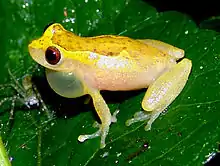Dendropsophus decipiens
Dendropsophus decipiens is a species of frog in the family Hylidae. It is endemic to eastern Brazil between the Pernambuco and Rio de Janeiro states,[2] or following IUCN, between the Maranhão and São Paulo states.[1] It is also known as Brazilian coastal treefrog.[2]
| Dendropsophus decipiens | |
|---|---|
 | |
| Scientific classification | |
| Kingdom: | Animalia |
| Phylum: | Chordata |
| Class: | Amphibia |
| Order: | Anura |
| Family: | Hylidae |
| Genus: | Dendropsophus |
| Species: | D. decipiens |
| Binomial name | |
| Dendropsophus decipiens (A. Lutz, 1925) | |
| Synonyms[2] | |
|
Hyla decipiens Lutz, 1925 | |
Dendropsophus decipiens is a very common species occurring in a wide range of habitats, such as open areas (pastures, grassland, and savanna), primary and secondary forests, and coastal restinga scrubland, at elevations up to 1,000 m (3,300 ft) above sea level. Typically, it is found on vegetation near water. The eggs are laid on tree leaves above bodies of water (both temporary and permanent); the tadpoles fall into the water where they continue to develop.[1] It is a very adaptable species that does not face any known threats and that occurs in many protected areas.[1]
References
- Andrade, G.; Potsch de Carvalho-e-Silva, S.; Gonçalves da Cruz, C.A. (2010). "Dendropsophus decipiens". IUCN Red List of Threatened Species. 2010: e.T55463A11301143. doi:10.2305/IUCN.UK.2010-2.RLTS.T55463A11301143.en.
- Frost, Darrel R. (2017). "Dendropsophus decipiens (Lutz, 1925)". Amphibian Species of the World: an Online Reference. Version 6.0. American Museum of Natural History. Retrieved 29 March 2017.
